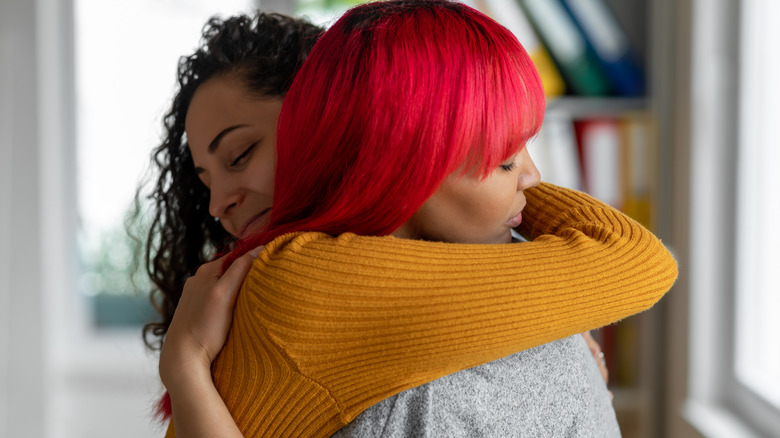Can You Be Friends With Someone You Love Who Doesn't Feel The Same? Therapist Weighs In - Exclusive
Being in love with someone who doesn't feel the same is a tale as old as time, and unrequited love is one of the most difficult things to navigate. But where things can get even more challenging and heartbreaking is when you fall in love with a friend. While it should come as no surprise that sharing an intimate bond with someone could lead to love or even have you falling for the outdated concept of them being "the one," it doesn't always mean that your friend is able to reciprocate in the way you want. When that happens, it comes down to two options: letting them know or keeping it inside. And the even more complicated question: can you stay friends despite what you're feeling?
"When we experience romantic feelings for a close friend, it can be incredibly stressful as we have to face the fear of rejection and possibly risk losing our friendship," CEO of Holistic Wisdom Lisa Lawless, Ph.D. tells Women.com in an exclusive chat. "Should you tell them? That depends."
When trying to figure out whether or not you can maintain your friendship with someone you're in love with, you might want to make a list of possible outcomes, as well as how it might feel to keep them in your life on a friend-only basis. From there, you can make the best decisions for your friendship and, most importantly, your mental and emotional health.
Ask yourself if you should tell them and why
It's important to realize that in telling your friend your feelings, it can go in one of two directions: they might surprise you and say they feel the same or they may tell you they don't share your feelings and you have to figure out how to deal with that. Of course, you don't have to tell them and you can try to handle getting over them in secret. But if you have an overwhelming urge to say something, make sure you're resolved in your decision. Once it's out there, you can't take it back.
"To determine whether or not you should share your feelings of amour, it may be helpful to ask yourself what you hope to gain from telling them," Dr. Lawless exclusively tells Women.com. "Ask yourself, do you hold out hope that they will reciprocate your feelings? Or is it simply to be honest and release your pent-up emotions? Perhaps a bit of both?"
According to Dr. Lawless, when you do come clean about your feelings, allow yourself to be vulnerable knowing that, "leaning into discomfort and keeping an open heart takes courage." Although it's your job to put your emotions first, don't forget how your words may impact your friend, as well as the realization that you're in love with them. While some people may have an inclination that a friend is harboring feelings for them, others may be completely clueless and therefore shocked by the news.
But also consider keeping things to yourself
If you can't pinpoint exactly why you want to tell your friend that you're in love with them, then consider not telling them. Especially if you know in your heart they don't feel the same way and you might risk losing their friendship or, at the very least, make things awkward and strained for a bit.
"If the signs have been clear that they don't reciprocate your feelings, consider processing them on your own or with a trusted friend or family member ... Sometimes, it may be wiser and more compassionate toward your friend to process your feelings privately," Dr. Lawless explained in an exclusive chat with Women.com. "Not every emotion needs to be shared, and sometimes, staying silent about such things can be a form of self-care. Ultimately, you should navigate your feelings by ensuring self-respect while empathizing with your friend's feelings as well."
As much as it may be painful to suffer in silence, if you already know how things are going to play out once you share such information then, as Dr. Lawless advises, it can be a form of self-care to keep it to yourself. If you want to avoid the possibility of a mutual friend breakup, then maybe the path of "grinning and bearing it" is the best one to take.
Make a plan for possible rejection
Being alive means dealing with rejection. Not just when it comes to love but in all realms. That's why whenever you take a risk, you should prepare yourself for it, whether it's a confession of love, a job you really want, or even that swanky, ultra-cool downtown club that only lets in celebrities or their doppelgängers — the possibility of being rejected is everywhere.
"If you have decided to share your feelings with your friend, remember, this is not about convincing them to return your feelings, but about expressing them to share your truth," Dr. Lawless explains exclusively to Women.com. "Remember that rejection of romantic feelings does not reflect on your worth. This is not an issue of being good enough or worthy of being loved. It boils down to compatibility and timing, which frankly are not within our control."
Falling in love isn't something anyone decides to do. We don't choose who we fall in love with, it just happens. You can't fault your friend for not feeling the same, just as much as they can't fault you for falling in love with them. So if they don't feel as you do, try your best to accept it and, as Dr. Lawless explains, them not being in love with you says nothing negative about you, nor does it say anything negative about them either. It just is what it is.
Prepare for a possible shift in the friendship
If you find yourself rejected, there's a lot to unpack. First of all, you need to protect your feelings, which could mean setting boundaries and stepping away from the friendship for a while so you can sort things out. Your friend may also be feeling awkward so they start pulling away despite promising that nothing would change — which can make everything feel worse.
"When a friend begins to distance themselves from us after we have shared romantic feelings that are not reciprocated, it's like being on an emotional high wire because you risk losing your friendship," explains Dr. Lawless to Women.com exclusively. "We often feel awkward because we feel uncertain and fearful of being hurt and rejected. However, leaning into this awkwardness is an excellent way to work through it, and you can do this by having an open conversation about the change you're noticing in their behavior."
Dr. Lawless suggests taking time to talk to your friend privately about the changes you've witnessed, but in a loving way, free of blame. "Try to show them compassion, as they may be feeling anxious about hurting your feelings and are worried about losing the friendship as well," Dr. Lawless states. Putting so much on the table can be overwhelming for both of you but being open to their concerns will help you both figure out what to do now that you've spoken your truth.
Be kind to yourself
No matter which route you take, be kind to yourself. It takes one heck of a strong person to admit they're in love with someone whom they're not sure loves them back, and one heck of a strong person to stay in a friendship with someone they love. Both situations speak volumes as to your courage and strength of heart.
"Remember it's okay to feel what you're feeling," Dr. Lawless explains exclusively to Women.com. "Let those feelings remind you that you're capable of love... Don't rush yourself to get over your feelings, but don't let them consume you either... If you find spending time with this friend challenging, needing some space from them is okay... things may not go back to 'normal,' but sometimes things need to change, evolve, or end for us to grow."
As much as unrequited love can be devastating, as Dr. Lawless points out, your feelings are proof you're capable of love and that's a great thing. Some people go through life avoiding love because of the possible pain that can come with it — what a loss for them! The pain is the good stuff, the pain reminds you that you dared to take a chance. While the fate of your friendship has a lot to do with its foundation, ultimately, you need to do what's right for you. "Loving someone who does not love us back is a tough journey... it's also an opportunity for self-discovery," says Dr. Lawless.





